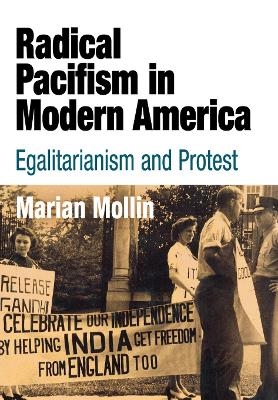
Radical Pacifism in Modern America
Egalitarianism and Protest
Seiten
2006
University of Pennsylvania Press (Verlag)
978-0-8122-3952-2 (ISBN)
University of Pennsylvania Press (Verlag)
978-0-8122-3952-2 (ISBN)
Radical Pacifism in Modern America illuminates the complex relationships between gender, race, activism, and political culture, identifying critical factors that simultaneously hindered and facilitated grassroots efforts at social and political change.
Radical Pacifism in Modern America traces cycles of success and decline in the radical wing of the American peace movement, an egalitarian strain of pacifism that stood at the vanguard of antimilitarist organizing and American radical dissent from 1940 to 1970.
Using traditional archival material and oral history sources, Marian Mollin examines how gender and race shaped and limited the political efforts of radical pacifist women and men, highlighting how activists linked pacifism to militant masculinity and privileged the priorities of its predominantly white members. In spite of the invisibility that this framework imposed on activist women, the history of this movement belies accounts that relegate women to the margins of American radicalism and mixed-sex political efforts. Motivated by a strong egalitarianism, radical pacifist women rejected separatist organizing strategies and, instead, worked alongside men at the front lines of the struggle to construct a new paradigm of social and political change. Their compelling examples of female militancy and leadership challenge the essentialist association of female pacifism with motherhood and expand the definition of political action to include women's political work in both the public and private spheres. Focusing on the vexed alliance between white peace activists and black civil rights workers, Mollin similarly details the difficulties that arose at the points where their movements overlapped and challenges the seemingly natural association between peace and civil rights.
Emphasizing the actions undertaken by militant activists, Radical Pacifism in Modern America illuminates the complex relationship between gender, race, activism, and political culture, identifying critical factors that simultaneously hindered and facilitated grassroots efforts at social and political change.
Radical Pacifism in Modern America traces cycles of success and decline in the radical wing of the American peace movement, an egalitarian strain of pacifism that stood at the vanguard of antimilitarist organizing and American radical dissent from 1940 to 1970.
Using traditional archival material and oral history sources, Marian Mollin examines how gender and race shaped and limited the political efforts of radical pacifist women and men, highlighting how activists linked pacifism to militant masculinity and privileged the priorities of its predominantly white members. In spite of the invisibility that this framework imposed on activist women, the history of this movement belies accounts that relegate women to the margins of American radicalism and mixed-sex political efforts. Motivated by a strong egalitarianism, radical pacifist women rejected separatist organizing strategies and, instead, worked alongside men at the front lines of the struggle to construct a new paradigm of social and political change. Their compelling examples of female militancy and leadership challenge the essentialist association of female pacifism with motherhood and expand the definition of political action to include women's political work in both the public and private spheres. Focusing on the vexed alliance between white peace activists and black civil rights workers, Mollin similarly details the difficulties that arose at the points where their movements overlapped and challenges the seemingly natural association between peace and civil rights.
Emphasizing the actions undertaken by militant activists, Radical Pacifism in Modern America illuminates the complex relationship between gender, race, activism, and political culture, identifying critical factors that simultaneously hindered and facilitated grassroots efforts at social and political change.
Marian Mollin teaches history at Virginia Tech in Blacksburg, Virginia.
List of Illustrations
List of Acronyms and Abbreviations
Introduction
Chapter 1: The War for Total Brotherhood
Chapter 2: The Peacemakers' Alternative Vision
Chapter 3: Familialism and the Struggle Against the Bomb
Chapter 4: Reviving the Compact of Brotherhood
Chapter 5: Reversing the Traditional Pattern
Chapter 6: No Bars to Manhood
Conclusion
Acknowledgments
| Erscheint lt. Verlag | 10.10.2006 |
|---|---|
| Reihe/Serie | Politics and Culture in Modern America |
| Zusatzinfo | 12 illus. |
| Verlagsort | Pennsylvania |
| Sprache | englisch |
| Maße | 152 x 229 mm |
| Themenwelt | Geschichte ► Allgemeine Geschichte ► Neuzeit (bis 1918) |
| Geisteswissenschaften ► Geschichte ► Regional- / Ländergeschichte | |
| Sozialwissenschaften ► Politik / Verwaltung | |
| ISBN-10 | 0-8122-3952-0 / 0812239520 |
| ISBN-13 | 978-0-8122-3952-2 / 9780812239522 |
| Zustand | Neuware |
| Haben Sie eine Frage zum Produkt? |
Mehr entdecken
aus dem Bereich
aus dem Bereich
Europa 1848/49 und der Kampf für eine neue Welt
Buch | Hardcover (2023)
DVA (Verlag)
CHF 67,20
Giordano Bruno - ein ketzerisches Leben
Buch | Hardcover (2024)
C.H.Beck (Verlag)
CHF 41,85


